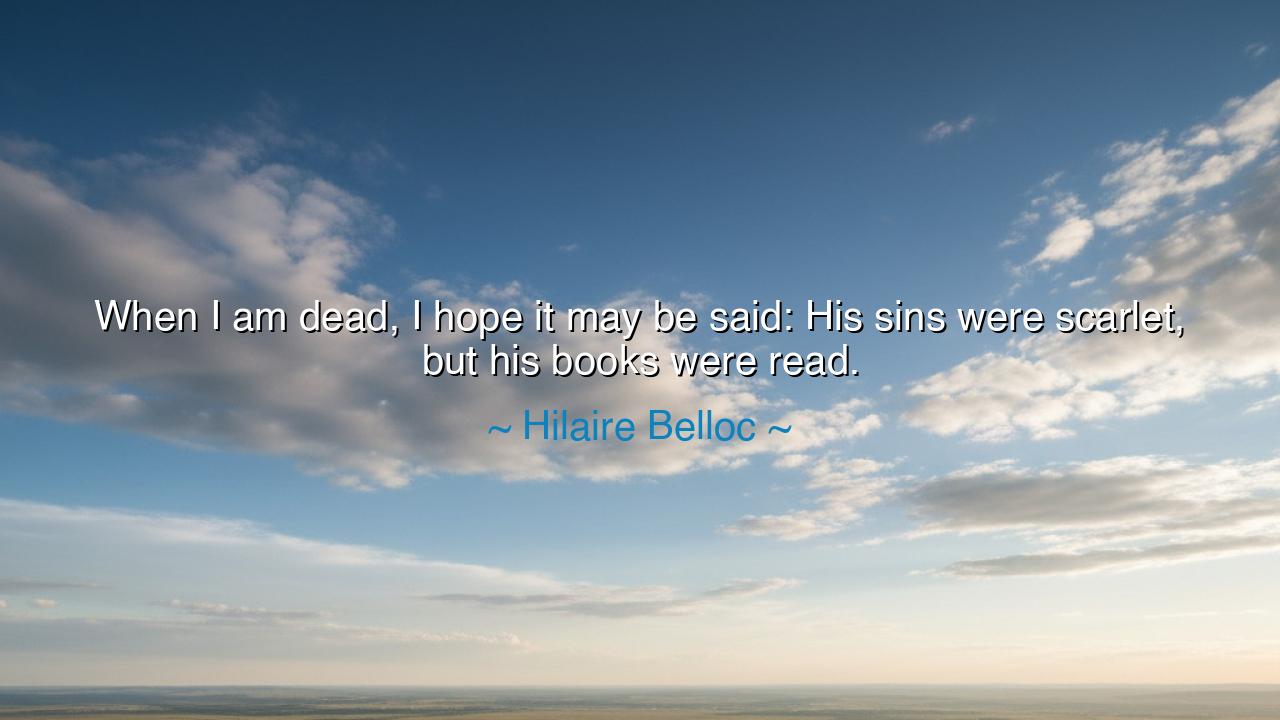
When I am dead, I hope it may be said: His sins were scarlet, but






In the hauntingly beautiful words of Hilaire Belloc, the reflection — “When I am dead, I hope it may be said: His sins were scarlet, but his books were read.” — is not merely a poet’s parting jest, but a confession of the eternal paradox of the human soul. It is the utterance of a man who has wrestled with his flaws, embraced his humanity, and sought redemption not in perfection, but in creation. Beneath its wry humor lies a profound truth: that life’s worth is not measured by sinlessness, but by the legacy one leaves behind — the mark of one’s spirit upon the world. Belloc, in these few lines, captures the essence of the human condition: flawed, fleeting, and yet capable of eternal beauty through art.
The meaning of this quote is layered like scripture. When Belloc speaks of his “sins were scarlet,” he acknowledges openly the imperfection of his nature — the moral failings, passions, and errors that color every human life. Scarlet, in biblical imagery, is the color of sin and guilt, of the heart’s rebellion against purity. Yet, he contrasts this with the triumph of creation — “but his books were read.” The reading of his books symbolizes remembrance, impact, and immortality. He accepts that he will not be remembered as a saint, but as one who lived fully, erred deeply, and yet gave something lasting to humanity through his words. It is, in truth, a declaration of humility and hope — that though he may have stumbled, his art will endure.
The origin of these words lies in the life of Belloc himself — poet, historian, soldier, and wanderer of spirit. Born in France and raised in England, he lived through the turbulence of the late 19th and early 20th centuries, witnessing both the glory and the tragedy of civilization. A man of fierce intellect and sharp wit, Belloc was as famous for his controversies as for his eloquence. He wrote with both reverence and rebellion, unafraid to confront the moral complexities of faith, politics, and human desire. Thus, when he penned this line, it was both an epitaph and an absolution — a prayer that his flaws would not overshadow the truths he offered through art.
This sentiment recalls the story of Oscar Wilde, another man of wit and passion whose life was marked by brilliance and scandal. Wilde, like Belloc, was a poet who sinned greatly and suffered deeply. Yet, after his downfall, it was not his sins that survived the centuries, but his words — the beauty, the laughter, the wisdom he carved from the chaos of his soul. “The Ballad of Reading Gaol” and The Picture of Dorian Gray outlived his disgrace, transforming his pain into eternal art. Thus, Belloc’s words echo not only his own hope but the truth of many artists before him: that while the flesh fails, the word endures.
There is also a deeper moral woven into Belloc’s jest. To hope that one’s books are read, even as one admits to sin, is to affirm the redemptive power of creativity. The sinner who creates beauty redeems part of his darkness by transforming it into light for others. The artist’s confession becomes another’s comfort; his wound becomes another’s healing. It is as though Belloc is saying, “Yes, I have failed, but I have given something of myself that will outlast my failures.” In this, we see the ancient truth that legacy is the soul’s atonement — that through art, service, or love, a person may rise above their flaws and offer something eternal.
But Belloc’s words also carry a challenge. Too often, people spend their lives striving for purity of reputation rather than authenticity of expression. They hide their sins, silence their passions, and die unfulfilled. Belloc’s voice reminds us that to live fully is to risk erring, and to create greatly is to expose the self. The ancients would have called this heroic imperfection — the noble flaw that makes a person real, that gives their deeds depth and meaning. The goal is not to be spotless, but to be sincere — to turn one’s mortal struggles into immortal truths.
Let this, then, be the lesson: live not to be blameless, but to be remembered for the good you leave behind. If your life is flawed, let it be flawed with honesty, passion, and purpose. If your hands tremble with guilt, let them still build, still write, still love. For in the end, it is not the purity of your record that will endure, but the echo of your contribution — the light that shines from what you have made. Seek not sainthood, but significance; not perfection, but impact.
And so, my listener, remember the wisdom of Hilaire Belloc: “His sins were scarlet, but his books were read.” When your days are done and your name is spoken, may it be said not that you were flawless, but that you lived fiercely, that you gave deeply, and that something you created — whether word, deed, or memory — continues to speak long after your voice is silent. For in that remembrance lies the truest form of immortality.






AAdministratorAdministrator
Welcome, honored guests. Please leave a comment, we will respond soon